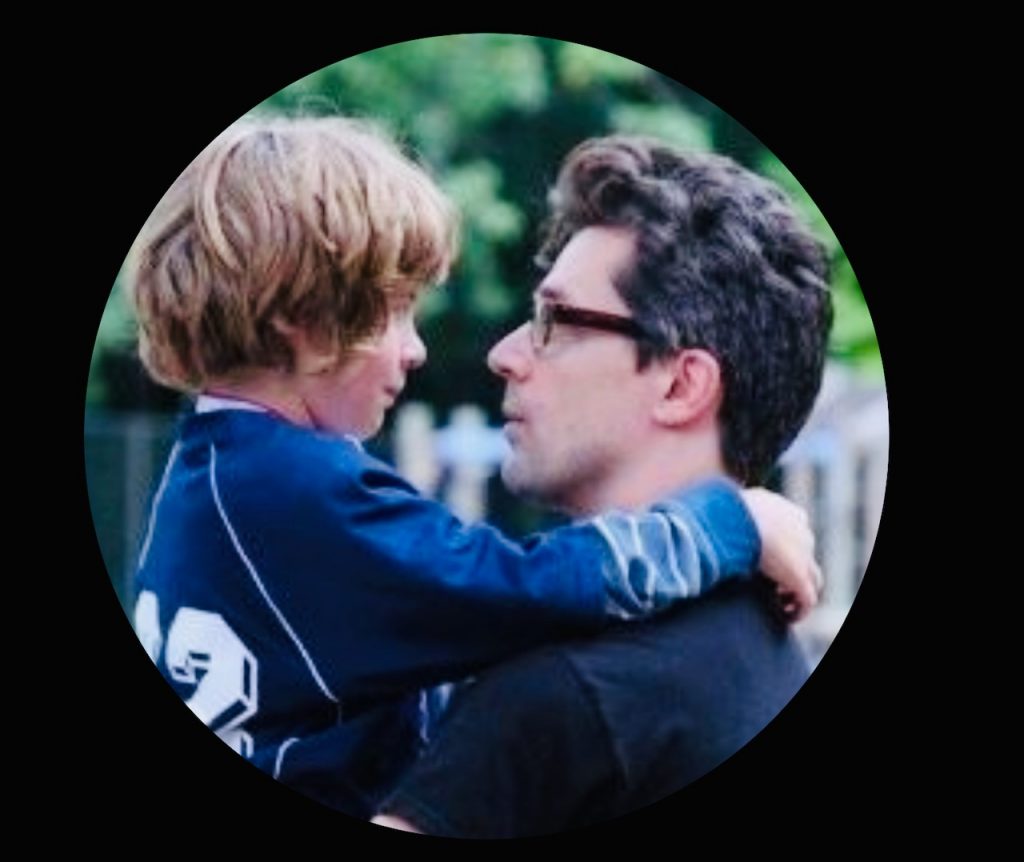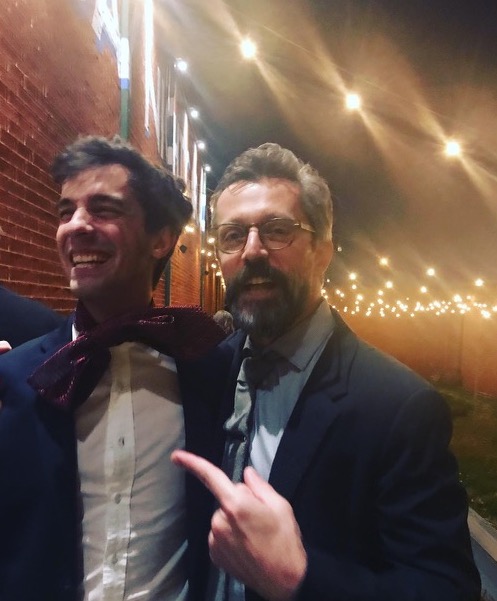Virgin Hair
Eye Medicine
Surely a dam broke? Surely something happened to push me along, to change things: a miserable interaction with a client or another lawyer? No, it was something much smaller… Well, Joy would take issue with my saying it was a little thing. It was ten pounds, four ounces. That’s small if you’re talking about lifting weights, or Buicks, but if you’re talking about newborns, it’s a lot.
Joy and I had planned. We’d taken classes. As if to break us in to what was to come, Oscar had a different idea. Ten pounds, fourounces and refusing to shift his position for delivery, Oscar wedged himself into the breech position and would not budge. As the nurses wheeled Joy into the operating room, she looked at me tearfully. Assuming it was something I’d said, I asked her why she was crying.
“I wanted a natural childbirth.”
Occasionally I have flashes of wisdom, though my delivery is often imperfect. “Or you could be grateful. You are five-foot-two, and the baby is over ten pounds. One hundred years ago, natural childbirth would have meant neither of you would survive. Maybe we could be grateful you’re not going to die. I don’t want to have to date again.”
“I love you, Gugger.”
“I love you too, Joy.”
The doctor sliced my wife’s abdomen open, and Oscar came out looking like a three-month-old. I knew the anesthesiologist. Burkhard Spiekermann was a respectable master’s runner in Charlottesville. He peered over the tarp — which I refused to cross — and told us he had good news and bad news. The good news was that we had a healthy baby boy, but alas, he was not going to be a distance runner. He was going to be a linebacker.
The day he was born, while laying on his mother’s chest, Oscar held his head up and had a good look around the room. One of the nurses actually gasped. He stood at nine months and walked at ten. He recognized words early, and started to speak early. But I guess after seeing the world, he decided it wasn’t worth the effort, so he retreated into himself, his own imaginings, his own details. He stayed there for quite some time. I’d quit HSF, and staying home with Oscar became my new full-time job. I didn’t have time to think about what I wanted to do for work any more. I had a new job. I had to figure out how to access his world, and ideally, help him connect with the rest of us. Joy and I had planned on my staying home for three years before going back to work. I wasn’t necessarily thinking law, but certainly something that involved wearing a suit and carrying a briefcase. Anything other than that would be a failure.
My three years at home with Oscar stretched into six.
Oscar and I developed routines. I cooked, I cleaned, and worked around the house. Back then, there weren’t as many stay-at-home dads, so it made us an oddity. I took to it well, as I do with many things that are odd.
To my great pride, Oscar was sensitive to music. He liked clean voices, singer songwriters — opera even. He did not care much for guitars, at least not the electric variety. Not to worry. I listened to Soundgarden and Iron Maiden with headphones during his naps.
We had to go to the grocery store at ten in the morning because it was the quietest time of day to shop. He was skittish, and a crowded store often brought tears. Playgroups were miserable. He would try to escape, succeeding on a couple of occasions. Oscar is excellent at achieving a thing when he has decided on it.
The only way to gain access to his world was to join, rather than to come at him with expectations. There I was, on the floor, in my dry-clean-only pants. I even played with paints and things I still do not like to touch. Fussy in my own way, I do not care to be wet, sticky, or dirty. But, such play made Oscar comfortable, and when comfortable, he might open up, just a tiny bit, and then we would see each other.
One day I gave him a bulky hat that covered his ears, and he was suddenly interested in exploring beyond the path around the lake he and I had walked since he was in a stroller. It was a pretty fancy bit of fathering, if I do say so myself. Covering his ears obliterated the overwhelming noise and released dormant courage.
There were adults who looked at him funny, and then looked at me funny. I felt it, but strangely it didn’t hurt. My pulse would accelerate, and my ears grow hot. This was my kid, my fine, strong, fantastic little boy. Who were they to judge? In a way, I was grateful for them, the judgers. They made my life easier by obviating the need to trifle with them or waste a moment’s feeling on them. There were better things to focus on. Before we had Oscar, I thought I was pretty good at not giving a shit what other people thought. Oscar raised me to a whole new level. I suppose he helped me unleash my own dormant courage.

One day, a few years before I’d even dreamed of going to beauty school, I took Oscar to a park. Equipped with his headphones and giant hat, Oscar ignored the other kids, as he did his ladder-and-slide routine, over and over. While he was so armored, the screaming children could have been present in ten times the number and not fazed him. As I watched the other children part of me wished I had headphones too. I found the noise of the crowded playground oppressive. While I do not think my face gave it away, the typical playground grabbing, pushing, and general brutish behavior repulsed me.
And yet, part of me couldn’t help but wonder why Oscar was not like the other children.
As I sipped my fourth or fifth coffee of the day, a woman arrived at the playground with a stroller and a little boy roughly Oscar’s age. She released her older child, and in a cloud of noise and dust he joined the other small monsters on the playground. As Oscar had the others, he ignored the unruly newcomer. The mother sat on a bench and stared into the distance, the stare of a parent blessed with a moment’s calm.
A few minutes later, the baby in the stroller began to wail. Across the playground, my son froze and looked around like a hunting dog. He jumped down from the jungle gym and ran over to the stroller. The mother started to say something, but Oscar brushed past her and thrust his head and much of his torso into the stroller. For a boy of few words, he suddenly had plenty. “It’s okay, baby. I can help you.” Then, as the mother watched in horror, my son gave her baby eye medicine.
Eye medicine is a simple therapy I invented for Oscar. Rub your hands together as fast as you can, then once they’re warm, put them tightly over teary eyes, whether yours or someone else’s. How the tears came to be does not matter, but it is preferable that the person knows you and consents to the procedure.
Anytime I gave him eye medicine, Oscar stopped crying and let out a long “oh.” It couldn’t make a problem go away, but it could settle even the most rattled Oscar and it worked for him from babyhood until adolescence. Try it on yourself; it’s nice.
The mother did not know about eye medicine. Understandably, she was alarmed by an unknown larger child holding her newborn baby’s head. As she raised her voice at Oscar and then at me, she did not notice that the eye medicine had worked. As if by magical transitive property, the baby’s agitation had jumped directly from infant to mother.
I yanked Oscar from the stroller.
“I’m so sorry,” I stammered, searching for some kind of truth — words that could explain this… everything. I had none, so I settled for “He really likes babies.” We fled before things reached a crisis. Barely keeping my voice calm, I dragged my son from the playground. “Oscar, you can’t do that,” I hissed crossly.
Of course Oscar was himself crying by the time I opened the car door and clicked him into his seat. I circled the car, ears burning, frustrated, embarrassed, disappointed in both of us.
I sat in the driver’s seat. Oscar’s face was red and tears ran down his cheeks. “I’m sorry she yelled at you, Oscar, but you…”
A tiny voice called out from the backseat. “Is the baby happy now, Daddy?”
As was often the case, Oscar had a lesson for me when I least expected it. “Yes, yes, the baby is okay now, Oscar. It’s okay — babies cry.”
He took a deep breath, repeating, “Babies cry.” He looked through the window to the playground, searching for the stroller. Then he asked, hope in his voice, “My eye medicine helped? She felt better after I gave her eye medicine?”
“Yes, Oscar. The baby felt better.”
We drove home, Oscar noticing details I did not. We drove down Roswell Road, and Oscar laughed as he informed me the car’s tires hummed in C, whereas on the Downtown Connector, the tires sounded a D sharp, moving over differently compacted asphalt at a higher speed.
That was the moment I knew I could not return to law.

Gregory Dobrasz lives in Atlanta with his wife, son, and two cats. He works as a hairdresser, writes, and is learning to play bass guitar. He has a self-published novel on Amazon called The Icarus Ring, and his memoir, Virgin Hair, should be published any day now.
